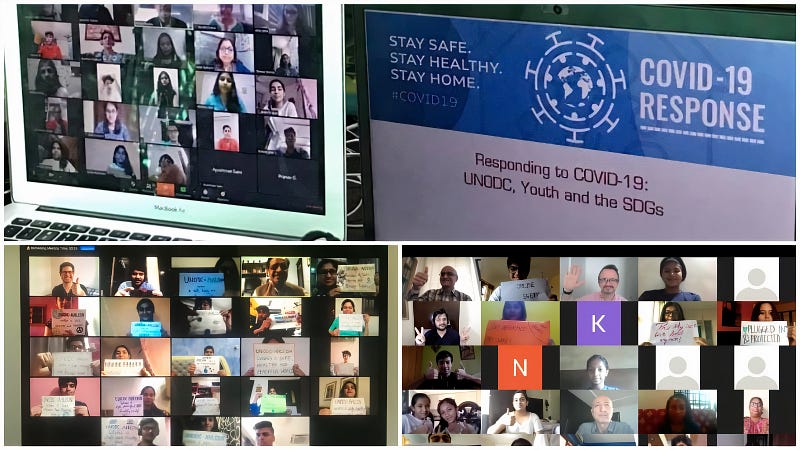
Responding to the COVID-19 pandemic, United Nations Office on Drugs and Crime (UNODC) has launched the ‘Lockdown Learners’ a series of online engagements with students and educators in India on COVID-19 and its impact on SDGs, peace and the rule of law. In support of the Education for Justice Initiative (E4J), these dialogues aim to sensitize students on concerns of vulnerable groups and emerging issues such as cybercrime, misinformation, gender-based violence, discrimination, mental health, and corruption, among others. These are not one-off sessions; but a series of interactions aimed at a longer-term collaboration with schools, with activity-based learning for students at its core.
Over the last fortnight, multiple interactions have been conducted with over 1500 students and educators from schools in the Indian states/Union territories of Delhi, Maharashtra, Karnataka, Punjab, Uttar Pradesh, and Haryana, and educational resources have been shared with over 14000 students in the schools. Online mediums like MS Teams, Google Meet, and even Whatsapp have been used, with due precautions taken on ensuring the privacy and safety of all students. Also, with support from the Commissioner of the Jawahar Navodaya Vidyalayas (JNV), E4J tools and resources have been shared with educators across 636 JNVs across the country — the total strength of students in JNVs across India is 2,65,574 — and as a pilot, multiple interactive sessions have been conducted with students from JNV Jhajjar.
“UNODC believes that crises like COVID-19 cannot be overcome without education, in line with the United Nations’ principle of ‘Leaving No One Behind’ and the Sustainable Development Goals (SDGs). A key area of focus is on the evolving implications of COVID-19 for children and youth, especially about human rights, health, peace, security, and the rule of law,” explained Sergey Kapinos, UNODC Regional Representative for South Asia.
“Some of these are also good practices that may also be emulated by others to reach students with limited internet access — for instance, in UNODC’s collaboration with the JNV in Jhajjar, we are working by interacting with groups of students through WhatsApp, using voice notes and audio recordings and images. These are cost-effective ideas that may be used by students with limited net connectivity,” said Samarth Pathak, UNODC Communications Officer for South Asia. “Every alternate day, the UNODC-JNV Jhhajar WhatsApp group starts buzzing at 11.30 with messages from a vibrant group of 30 bright students, all keen to learn more about the UN, COVID-19 and its impact on vulnerable groups and the SDGs,” he added.
UN diplomats and UNODC experts from other countries are also lending their support: for instance, the UN Cyber Chief Neil Walsh engaged with over 500 students, educators, and parents from across India in an interactive dialogue on cybercrime and online safety, conducted in collaboration with Bengaluru’s The Legacy School. The discussion was live-streamed on Facebook and touched upon issues such as bitcoins and cryptocurrency, cyberbullying, data protection, hacking, and even career paths.
UNODC welcomes schools to join these efforts in creating a positive framework for students to be productive and engaged during this period of lockdown, to reduce stress through positive messaging, and to empower young people to become champions of tomorrow.
The COVID-19 pandemic has affected billions of people around the world and impacted all aspects of life and society. In the area of education, for instance, nearly 165 countries have implemented country-wide school and university closures, as indicated by the Secretary-General in his report ‘Shared responsibility, global solidarity: responding to the socio-economic impacts of COVID-19.’ More than 1.5 billion children and youth are currently out of school or university, representing 87% of the world’s enrolled student population. Besides, over 60 million teachers are no longer in the classroom.
